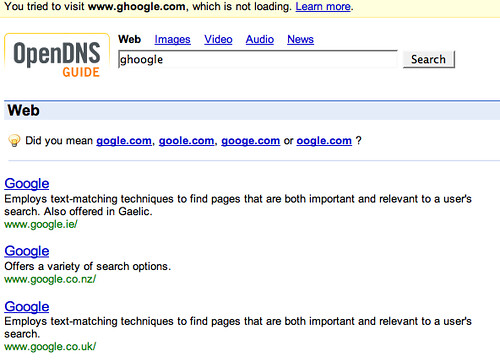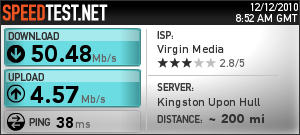OpenDNS has garnered a lot of positive press over the last year. Frustratingly NTL’s use of proxies meant that no matter what I tried, OpenDNS could not be configured on it’s network which meant I couldn’t move to the service.
While I was cleaning up my bookmarks I stumbled again on OpenDNS and now that NTL & Telewest have merged into Virgin Media I thought it was worth trying one last time. Success. So what does OpenDNS do?
DNS requests are made every day from your home connection. E-mails, web surfing, online gaming etc all make use of DNS. DNS turns real addresses (www.apple.com) into an IP address for the physical computer you want to connect to. It makes it easier to surf and also means an address can stay fixed while the computer changes in the background (to a different IP address). Usually you make use of your own ISP’s DNS server which in general works OK but from time to time can have issues. Speed, lack of redundancy and update issues are ones I’ve seen over the years.
OpenDNS provides a free DNS service that promises to resolve addresses quickly and also a few unique services that I certainly don’t get from my current ISP. Firstly there are anti-phisihing features in place so that you will be warned and the phishing site intercepted should you be lead to one. There’s also spelling correction where OpenDNS will look at the URL you’ve typed and if it detects a typo it will redirect you to the correct site. Finally if you look up a site that cannot be resolved OpenDNS will display a page with aletrnatives.
 You can turn off these features if you find they get in the way and you can also see stats on domains visited, IP’s requested etc but that isn’t the killer feature for me. It’s the speed.
You can turn off these features if you find they get in the way and you can also see stats on domains visited, IP’s requested etc but that isn’t the killer feature for me. It’s the speed.
Since moving to OpenDNS web surfing has taken on an extra zip. Click on a link now and the page is served far quicker than it was using Virgin’s DNS servers. I’m taking 2-4 seconds quicker for me but your mileage may vary. I’m also convinced that I’m using a more redundant service than my ISP’s servers but time will really tell with regards reliability. The added security features are a bonus but I really do recommend swapping to OpenDNS and at least giving it a shot (that for any ISP you use, not just Virgin). There are great guides on the site for most common routers and operating systems that take you through the small changes that you need to make. Have a go and enjoy a faster and more secure web.

